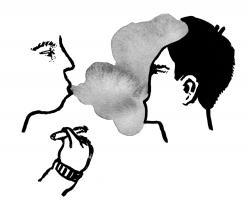 A quarter century ago, a presidential candidate, responding to a reporter’s question, admitted that he had used marijuana. But, he added, he did not inhale. Everyone got a good laugh over what seemed an absurdity, but a medieval scholastic would have taken the point: He had worked the edges of the mendacium but not the falsiloquium, for in strictest terms Bill Clinton was speaking the truth while intending to mislead. That he did not inhale did not foreclose the possibility that he had scarfed down mountains of hash brownies.
A quarter century ago, a presidential candidate, responding to a reporter’s question, admitted that he had used marijuana. But, he added, he did not inhale. Everyone got a good laugh over what seemed an absurdity, but a medieval scholastic would have taken the point: He had worked the edges of the mendacium but not the falsiloquium, for in strictest terms Bill Clinton was speaking the truth while intending to mislead. That he did not inhale did not foreclose the possibility that he had scarfed down mountains of hash brownies.
There is truth, and then there is falsehood. Immanuel Kant, who studied the problem more thoroughly than any of his contemporaries, held that it was one or the other, and he was unforgiving: “By a lie,” he wrote, “a human being throws away and…annihilates his dignity as a human being.” He declared that the legal definition of a lie, namely a falsehood that causes someone harm, was too generous: A lie is a lie is a lie.
Augustine, his predecessor in pondering falsehood, was more forgiving, taking care to distinguish the harmful from the harmless. We call the latter category “fibs,” or, if one is inclined to kindness, “white lies,” the former being the kinds of falsehoods that the Oxford English Dictionary deems “trivial,” the latter a fib meant to make the recipient of the lie feel better—telling someone on her deathbed that she looks great, say. Augustine gives them a pass, just as he allows for jokes, which so often play on untruths.
We live in a time when facts are alternative and truth is on the run, a time when the nation’s president lies with every heartbeat, shamelessly, about the most useless of things. (Dryden: “I do not say he lyes neither: no, I am too well bred for that: but his Lordship fibbs most abominably.”) If lying was one of the first things that Eve learned in the Garden of Eden, lying comes very early on in every child’s education, its fundamental purpose to declare, “I didn’t do it!” The lie may be harmless, it may be useless, it may be what Hannah Arendt called a “totalitarian lie,” it may be murderous; whatever the case, the president, who never outgrew the stage, is the source of a wallopingly reflexive array of falsehoods, beating his own impressive record on September 7, 2018: “In that single day,” reports the Washington Post, “he publicly made 125 false or misleading statements—in a period of time that totaled only about 120 minutes. It was a new single-day high.”
As of that date, the Post added, the president had publicly issued more than 5,000 lies—the Post’s term— during his tenure. When onetime spokesperson Hope Hicks said that her job occasionally required her to tell “white lies” on his behalf, there was nothing white about it: If there were anyone whose feelings she intended to spare, it was he alone. As for the rest of us, daily beset by official lies, falsehoods, fibs, mendacia, falsiloquia, and other such counterfactuals, let us scream, with the late John Lennon, “Gimme some truth!”






